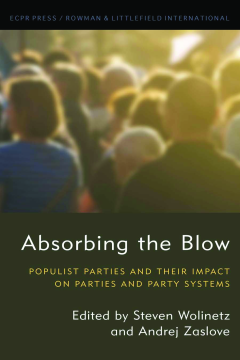
Additional Information
Book Details
Abstract
The significance of populist parties and their presence in party systems is undeniable. Parties like the Dutch Freedom Party, the French National Front, and the Five Star Movement in Italy rank among the largest political parties in their party systems. Absorbing the Blow examines the effect of populist parties on eleven European party systems. The results are mixed. The book finds that impact often depends on the influence that populist parties have had on mainstream political parties -- those that hitherto dominated party competition. In some instances, populist parties reinforce existing patterns of competition and government formation. Party systems that were bipolar continue to be bipolar. In others change occurs, either because populist parties make it difficult for mainstream parties to form coalitions that were hitherto possible, or because their presence allows mainstream parties to form coalitions that were not previously conceivable. This collection seeks to analyse the way in which mainstream parties absorb the blow of populist party activity, and concludes that populist parties are one of several factors contributing to changes in party systems.
This is a timely book. As the editors point out in their introduction, populists are now the single most successful post-war political family. Written by renowned experts, the country chapters cover a good cross-section of relevant European party systems and show that populist parties represent one of several factors that reshape party systems.
Thomas Poguntke, Chair of Comparative Politics and Director of the Düsseldorf Party Research Institute (PRuF), Heinrich-Heine-Universität Düsseldorf
Steven Wolinetz is Professor Emeritus at Memorial University of Newfoundland in Canada. Wolinetz writes about parties and party systems, smaller democracies - especially the Netherlands and Belgium - and the European Union.
Andrej Zaslove is Assistant Professor of Comparative Politics at Radboud University (Nijmegen, The Netherlands), at the Department of Political Science, in the Institute for Management Research. His research focuses on comparative European politics, political parties, with a special emphasis on populism and the radical right.
In sum, this book provides well-crafted historical and analytical insights on the role of populist parties in European party systems. It is an essential source for students of populism, especially for those who are interested in the consequences of populism. Its rich description of different cases makes this edited volume valuable reading for teaching populism-related, country-specific or region-specific content and the evolution of political systems in Europe.
This set of sophisticated case studies provides the basis for a wide-ranging comparative analysis that asks how the rise of populist parties is changing European party systems. The record shows that by reshaping the competition for votes, and the competition for government, populist parties have been the midwives of competitive processes working to transform the continent’s party systems and democratic politics.
R. Kenneth Carty, Professor Emeritus of Political Science, The University of British Columbia
Wolinetz and Zaslove’s volume not only represents an important contribution to our understanding of the impact of populism on European party systems, but it is also a highly illustrative, up-to-date introduction to the contemporary politics of many European countries for scholars of comparative politics and populism, as well as for a broader audience, including students, policymakers and journalists.
Table of Contents
| Section Title | Page | Action | Price |
|---|---|---|---|
| Absorbing the Blow | Cover | ||
| Contents | v | ||
| Part I: Introduction | 1 | ||
| 1 The Impact of Populist Parties on Party Systems | 3 | ||
| Part II: Simple and Extended Multiparty Systems | 25 | ||
| 2 The Impact of the Populist Radical Right on the Austrian Party System | 27 | ||
| 3 From Limited Multipartism to Extended Multipartism? The Impact of the Lijst Pim Fortuyn, the Partij voor de Vrijheid and the Socialistische Partij on the Dutch Party System | 55 | ||
| 4 Political Achievements, Party System Changes and Government Participation: The Case of the ‘New’ Swiss People’s Party | 83 | ||
| 5 Shaken, but Not Stirred: How Right-wing Populist Parties Have Influenced Parties and Party Systems in Scandinavia | 103 | ||
| 6 Finnish Populism: Keeping It in the Family? | 145 | ||
| Part III: Bipolar and Post-Communist Party Systems | 169 | ||
| 7 No Longer a Pariah? The Front National and the French Party System | 171 | ||
| 8 Italian Populism: Toppling and Re-building the Party System Twice | 197 | ||
| 9 Earthquake or Hurricane? The Rise and Fall of Populist Parties in Poland | 223 | ||
| 10 Governmental and Oppositional Populism: Competition and Division of Labour | 251 | ||
| Part IV: Conclusion | 273 | ||
| 11 Populist Parties and the Changing Contours of European Party Systems | 275 | ||
| Index | 321 | ||
| About the Contributors | 337 |
